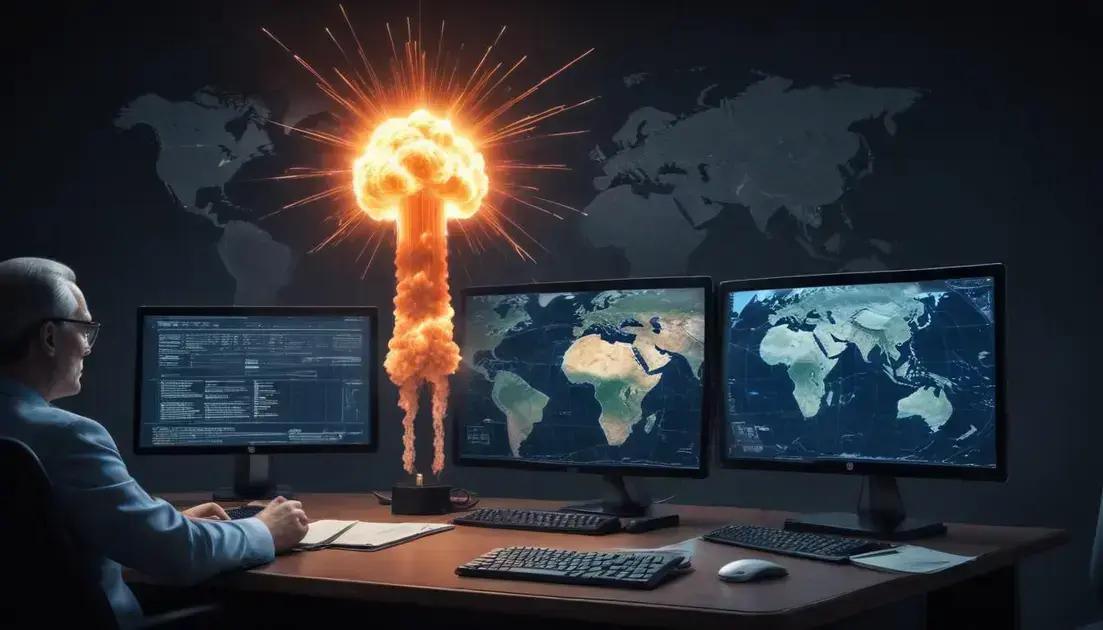
The AI Cold War: America vs China
The AI Cold War between America and China is reshaping global dynamics, impacting economies, military strategies, and international relations. Both countries are heavily investing in artificial intelligence technology, which enhances military operations and creates economic shifts. The competition fosters innovation but also raises ethical concerns, particularly regarding privacy and job displacement. Understanding these implications is essential for navigating the changing landscape of international power and ensuring responsible development of AI technologies.
In the midst of today’s technological revolution, the **AI Cold War** between America and China is not just about competition—it’s about survival! How will this rivalry shape our future?
The Rise of AI Technology
The rise of AI technology is changing our world quickly. More businesses are using artificial intelligence to improve their operations and decision-making. From customer service chatbots to advanced data analytics, AI is everywhere.
Many companies now rely on machine learning to predict trends and behaviors. This helps them stay ahead of their competitors. With AI, businesses can analyze customer data faster and more accurately.
Accessibility of AI Tools
Thanks to the growth of software solutions, AI tools are more available than ever. Small and medium-sized businesses can tap into cloud-based AI solutions without breaking the bank. Services like AI for marketing, sales, or even finance are just a click away!
The Impact on Jobs
While some fear that AI might take away jobs, others see it as a way to enhance our work. AI can take over boring tasks, freeing up employees to be more creative and strategic.
Balancing Innovation and Ethics
However, as we embrace AI, we must also be mindful of the ethical challenges. Issues like data privacy and job displacement need careful thought. It’s essential for companies to use AI responsibly and to protect consumer rights.
As we look ahead, the rise of AI technology promises exciting possibilities. Embracing this change can help drive innovation and growth across all industries.
Key Players: America and China
The rivalry in AI technology is mainly between two giants: America and China. Both countries are making huge investments to lead in this field. American companies like Google, Microsoft, and Amazon are at the forefront, developing new AI tools.
China is also stepping up its game. Companies like Alibaba and Baidu are evolving rapidly in AI research. They focus heavily on integrating AI into everyday life, boosting their economy.
Government Support and Strategy
Both nations have strong government backing. The U.S. government invests in research and development to stay competitive. Meanwhile, the Chinese government has a plan called the Next Generation Artificial Intelligence Development Plan. This plan aims to make China a world leader in AI by 2030.
Collaborations and Partnerships
Collaboration is key in this race. American firms partner with universities to advance AI studies. At the same time, China encourages business alliances to innovate faster. These partnerships can drive breakthroughs and accelerate growth for both sides.
The Importance of Talent
Talent is crucial as well. Both countries are competing to attract the best minds in AI. Universities and tech schools in both nations are pushing students toward this field. They want to build a strong workforce for tomorrow’s AI demands.
As America and China continue to invest and innovate, this rivalry could reshape the future of technology globally.
The Economic Impact of AI Warfare
The economic impact of AI warfare is significant and growing. As countries invest in AI technologies for military purposes, they’ll see shifts in defense budgets and spending patterns. AI can enhance the efficiency of operations, making military actions faster and more effective.
By using AI, nations can save money on traditional military equipment. This includes reducing the need for human troops in dangerous situations. Unmanned systems, like drones, are a prime example of this shift.
Job Creation and Displacement
While AI can create jobs in tech and defense sectors, it may also displace workers in other areas. Regular military roles might decline as AI takes over tasks. Training programs for displaced workers can ease this transition.
Global Competition
The AI arms race is about more than just military power. It also affects economic stability globally. Countries leading in AI warfare can gain a strategic advantage, attracting investments and fostering innovation. This can lead to economic growth in those regions.
Implications for Insurance and Finance
As conflicts increasingly involve AI, the insurance and finance sectors must adapt. New risks arise that need coverage, like cyber-attacks on AI systems. This growing complexity will shape how businesses in these areas operate.
Understanding the economic impact of AI warfare is crucial for policymakers. It helps them navigate the changing landscape of global security and finance.
Future Implications and Insights
The future implications of AI in international relations are vast. As technologies evolve, countries must navigate new challenges and opportunities. AI could enhance diplomatic efforts and improve communication between nations.
Moreover, AI has the potential to reshape military strategies. Nations might rely more on autonomous systems in conflicts. This could lead to fewer human casualties and a faster response in crisis scenarios.
Impact on Global Economy
Additionally, AI will influence global economies. Countries that adapt quickly will benefit financially. They can boost efficiency and innovation in various sectors. Investing in AI research and development is crucial for gaining a competitive edge.
Ethics and Accountability
As AI usage grows, so do ethical concerns. Issues like privacy, bias, and accountability are vital. Governments and organizations need clear guidelines to ensure responsible AI use. Balancing progress with ethics is essential for societal trust.
Collaboration Over Competition
Lastly, international collaboration will become increasingly important. Countries may find more common ground on AI standards and regulations. Partnership can help tackle global challenges, like climate change and healthcare, using AI solutions.
Understanding these future implications is key for anyone interested in the evolving landscape of AI and international relations.
Conclusion
In conclusion, the rise of AI technology brings both opportunities and challenges. As we explore the economic impact of AI warfare, it’s clear that nations need to consider how these advancements shape our world. AI can enhance military operations while also creating economic shifts.
It’s important for countries to invest wisely in AI and work together to set ethical guidelines. Cooperation can lead to better results for everyone. By focusing on responsible AI development, nations can help ensure a safer and more stable future.
The implications of AI extend beyond military use. They touch on global economies, job markets, and our daily lives. Understanding these factors will prepare us for the changes ahead. Ultimately, embracing AI with care can lead to a brighter and more productive future for all.


